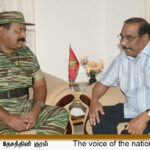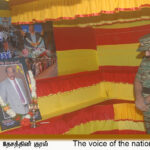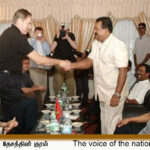

The voice of the nation” is irreplaceable for the Tamil Eelam.

“The voice of the nation” is irreplaceable for the Tamil Eelam. – The national leader said.
“The light of our nation”, which sided with me in the political and diplomatic movements of our freedom movement, has been extinguished today. Bala Brother is not with me today to give me advice. His death is a big loss not only for me but also for the nation of Tamil Eelam.
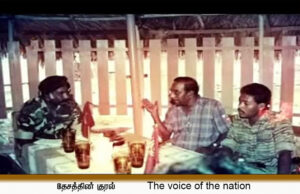 Human life is a period of time that stretches between birth and death. This life span is not the same for all human beings. Gathers indefinitely for one, shortens for another, and longs for another. Unfortunately, Bala Brother´s life came to a standstill. His death comes at a time when he has a lot of work to do for our intensified liberation war. I cannot accept this. The burden of grief presses on my soul. It breaks my heart. I cannot put into words the flood of emotions that rage in me. There is no word for this in any language.”
Human life is a period of time that stretches between birth and death. This life span is not the same for all human beings. Gathers indefinitely for one, shortens for another, and longs for another. Unfortunately, Bala Brother´s life came to a standstill. His death comes at a time when he has a lot of work to do for our intensified liberation war. I cannot accept this. The burden of grief presses on my soul. It breaks my heart. I cannot put into words the flood of emotions that rage in me. There is no word for this in any language.”
The lion is the king of all jungles. However, the tiger is the king of our jungle! (This is what Anton Balasingham, Voice of the Nation, said in an interview in London)
“The national leader Prabhakaran once told me, “Rest is only possible for us in death!” That is the truth!”
Shake hands with spring and say goodbye to winter. In South London, Anton Balasingham, the LTTE’s political adviser, lives simply with his wife, Adele Balasingham.
In the midst of diseases that afflict the body such as kidney disease and diabetes, he is enthusiastic about his tireless work, restless travels and work activities for the nation of Tamil Eelam!
Anton Balasingham talks about his alliance with the LTTE:
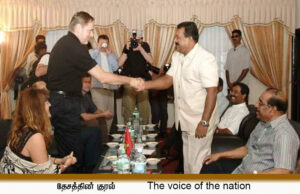 I first met Adele in 1978 when I was a professor at the University of London. We began to participate in various political movements. In the struggles for the liberation of countries such as South Africa, Palestine and Zimbabwe, we have been actively fighting against American colonial imperialism. It was in this context that Prabhakaran, the leader of the Liberation Tigers of Tamil Eelam (LTTE), contacted me. He asked for a translation of various ‘guerrilla’ liberation struggles and their histories into Tamil. He wanted med to give the Liberation Tigers of Tamil Eelam (LTTE) political training classes. I first met Prabhakaran in Chennai. After that, I came to Chennai every year, stayed for a few months, and started conducting political training classes for the fighters. That is how our friendship started!
I first met Adele in 1978 when I was a professor at the University of London. We began to participate in various political movements. In the struggles for the liberation of countries such as South Africa, Palestine and Zimbabwe, we have been actively fighting against American colonial imperialism. It was in this context that Prabhakaran, the leader of the Liberation Tigers of Tamil Eelam (LTTE), contacted me. He asked for a translation of various ‘guerrilla’ liberation struggles and their histories into Tamil. He wanted med to give the Liberation Tigers of Tamil Eelam (LTTE) political training classes. I first met Prabhakaran in Chennai. After that, I came to Chennai every year, stayed for a few months, and started conducting political training classes for the fighters. That is how our friendship started!
Over the years, Prabhakaran and I have had differences of opinion. But the goodwill between us has never been affected. Because we are best friends.
I was the one who shaped the thinking, ambition and political policy of the LTTE. However, Prabhakaran, who is the father of the armed struggle, is the one who systematized and planned this movement for warfare study. It is with my politics and his struggle that our liberation struggle is carried forward. We give him historical significance as a leader.
I am a volunteer in this movement. The lion is the king of all jungles. But the tiger is the king of our jungle! Balasingham says with a beautiful smile.
We ask questions. He laughs at some questions. Avoids some questions. But whatever is being talked about, its history and related statistics are pouring in from Balasingham.
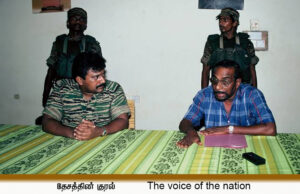 “What do you think about the fact that India, which first recognized the LTTE as a militant organization and initiated negotiations on the Eelam issue, is now distancing itself from the Eelam issue?”
“What do you think about the fact that India, which first recognized the LTTE as a militant organization and initiated negotiations on the Eelam issue, is now distancing itself from the Eelam issue?”
“India has shown sympathy and compassion for the Eelam Tamil people since before the emergence of the LTTE. That is because even though we are in Eelam, we are racially Indians! Our original history begins in India.
In the eighty-third year, a massive phase of violence against Tamils in Sri Lanka was unleashed and tens of thousands of Tamils were killed. Possessions were damaged. It caused great turmoil in Tamil Nadu. The people of Tamil Nadu showed their support for the Eelam Tamils through rallies. Only then, did the Eelam Tamil problem become something that did not involve the island of Ceylon; The world realized the fact that its effects would have an impact on India as well.
After that, the Indian government began to intervene directly in the Eelam Tamil issue. It is in this context that India nurtured us by arming our LTTE and some other militant groups as a shield for the security of Eelam Tamils. This is historical fact!
We will never forget it. India helped us so much, recognized us as a liberation movement and made us participate in the Thimphu talks. After that for some reason, some conflict arose between the Indian government and the LTTE (at this point, he carefully avoids some past events).
There were some heartbreaking incidents. Yet, overall, India has always been sympathetic to Eelam Tamils. I want this situation to continue.”
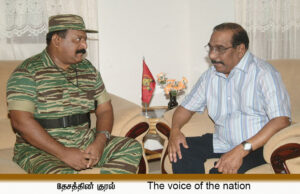 “What do you think is the main reason for the conflict between India and the LTTE?”
“What do you think is the main reason for the conflict between India and the LTTE?”
The LTTE was adamant that Tamil Eelam should become an independent state. We firmly believe that these people will not get any justice from the Sinhala chauvinists. That is why we were clear in reclaiming our soil and creating an independent Tamil Eelam for ourselves. However, the Indian government does not want this.
They refused to accept our ambition for fear that if a separate state was formed in Tamil Eelam, it would create a sense of separatism in Tamil Nadu and other communities in India. This is the basis fact on which the conflict arose.”
“Do you think there will be a change in the attitude of the Indian government now?”
“India directly intervened militarily in this matter and took a major military action against the LTTE and suffered a major defeat. The LTTE was not crushed by the Indian military. Otherwise, the LTTE did not want to hate India. We never wanted to take up arms against India, except that we were compelled to fight because war was imposed on us.
Because we, who see Tamil Eelam as our motherland, have always seen India as our fatherland. We also expect good relations between the LTTE and the Government of India. My view is that such a situation will definitely happen soon.”
“What do you consider to be the moment that shifted your contribution to the Eelam struggle?”
“The tragic incident that took place when the Indian peacekeepers were in Eelam is deeply etched in my mind.
Fifteen key figthers, including Kumarappa and Bulendran, were unarmed by the Sri Lankan navy and detained at the Palaly army camp on October 2nd 1987, off the coast of Point Pedro. I was given the responsibility of talking to the Government of India and the Indian Ambassador to Sri Lanka and releasing them.
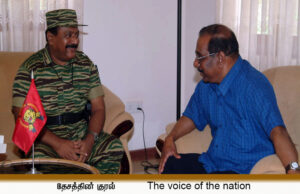 When I spoke to the Indian ambassador, he expressed confidence that he could talk to the Sri Lankan army and release them. I met the fighters in the Palaly army camp, which was under the control of the Sinhala army, with the help of Indian peacekeepers. The Sinhala army stood there pointing their guns at the fighters as if they were sitting on the ground like criminals. I talked to the fighters. They were happy and undisturbed and full of hope that they would be released.
When I spoke to the Indian ambassador, he expressed confidence that he could talk to the Sri Lankan army and release them. I met the fighters in the Palaly army camp, which was under the control of the Sinhala army, with the help of Indian peacekeepers. The Sinhala army stood there pointing their guns at the fighters as if they were sitting on the ground like criminals. I talked to the fighters. They were happy and undisturbed and full of hope that they would be released.
Kumarappa and Bulendran were recently romantically married. They say to their wives, “Don’t worry. We will be back soon”. But the next day the situation worsened. Indian military officials told me that Sri Lankan Defense Minister Athulath Mudali had secretly planned to bring the fighters to Colombo and interrogate them.
I met the fighters again. Then they sent me a secret letter to the national leader Prabhakaran. I sent that letter to the leader that night. According to the operating tradition, it was a letter written to give the enemy cyanide bottles in order to achieve heroic death without being trapped. Prabhakaran’s eyes widened after reading it. After thinking for a while, he spoke further with the Indian government and asked them to rescue the fighters immediately. I tried again. But, none of my efforts paid off. The Indian ambassador also said that the situation was so dangerous that he could not do anything about it.
The next day, the Indian ambassador told me that Athulath Mudali had sent a special military plane to Palali and that our fighters would be forcibly loaded on the plane at five that evening.
I immediately rushed and informed Prabhakaran. Prabhakaran’s face became disfigured as various emotions mixed with sadness, anxiety, anger and frustration. He called his bodyguards, the Tiger soldiers, and picked up the cyanide poison bottles hanging around their necks and put them around my neck and around Mataiah’s neck in the evening. An order was also issued to somehow add the bottles to our fighters.
That afternoon I went to the Palaly base with lunch packs and completed the leader’s request during the final meeting with our fighters. Instead of being trapped by the enemy, the fifteen fighters bit the cyanide bottle to take their own lives. Ten of our most important fighters were martyred on the spot when the Sinhala soldiers tried to stop the poison from flowing into their hearts by piercing their throats with pistols. Only five survived.
This is the saddest event that has ever shaken my soul in my experience of the LTTE’s ambition to fight for Tamileelam!”
- From an interview for Shakti Media



